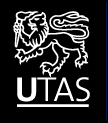Jo Randall – Introductory PhD seminar
Friday 14 October, 1:30-2:00 PM
IMAS Seminar Room, Sandy Bay
Abstract:
Successful management of marine systems requires robust understanding of ecosystem processes, including production, and therefore suitable tools for accurate measurement in space and time. Currently, there are a number of techniques which measure the productivity of marine macroalgae, both as individuals and collectively at small spatial scales. In addition, recent research using acoustic sensing suggests the possibility of sophisticated new techniques to allow large-scale, continuous measurements of photosynthetic productivity in seaweed based systems. However, there has been little research to compare measurements across the different techniques; quantify intra-specific spatial and temporal variability in production; or to quantify the effects of temperature and nutrients on production rates in the context of long term climate change.
This work, focused on three key habitat-forming brown seaweeds in Australia (Ecklonia radiata, Phyllospora comosa, and Macrocystis pyrifera), will compare techniques of Pulse Amplitude Modulation (PAM) fluorometry, respirometry and, for the first time, hydroacoustics to indicate photosynthetic potential or production. Using PAM fluorometry, variation in photosynthetic potential among different parts of the algal thallus, between individuals of the same species, and between depths, times and latitudes will be quantified. In addition, the project will assess the application of acoustics to estimate production in seaweeds and the scalability of production estimates, and compare among signals from PAM, respirometry and acoustic techniques. Finally, the work will investigate the effects of external factors (nutrients and temperature) on productivity estimates, with a particular focus on effects of epiphytic growth on estimates. This talk will give an overview of the project and discuss the underlying methodology, in addition to presenting preliminary results.


